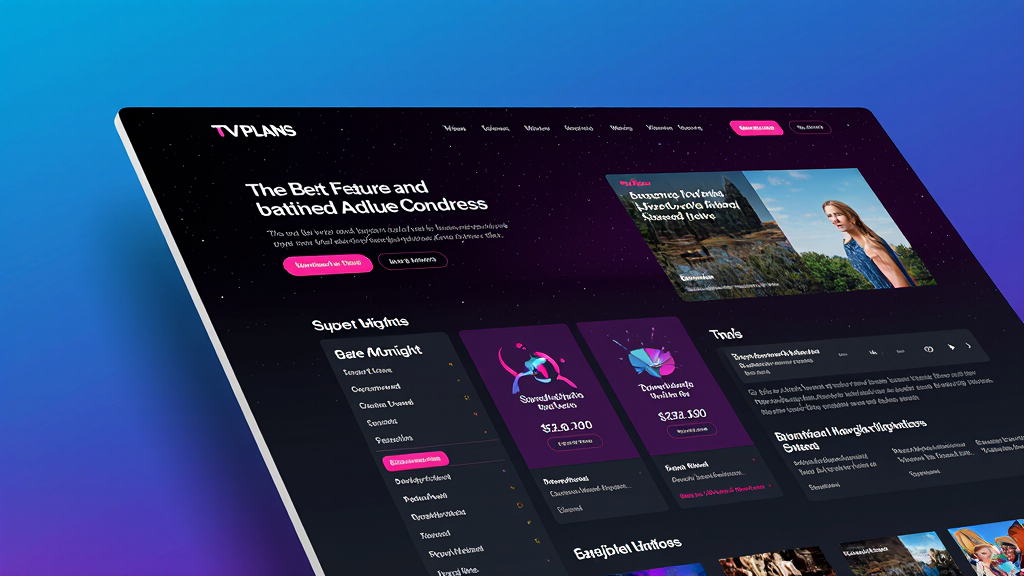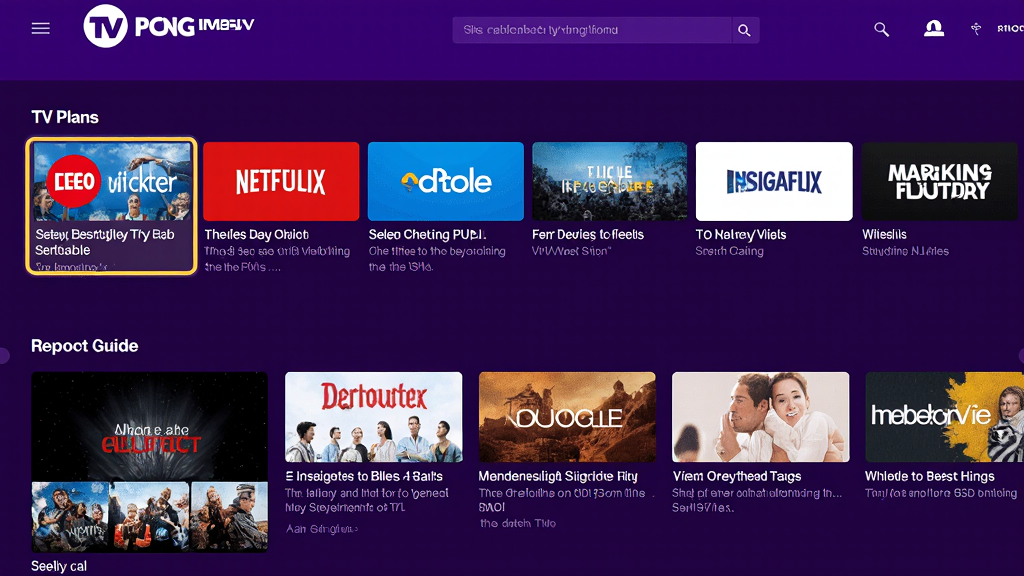Table of Contents
Introduction
Television has always been a reflection of culture, technology, and consumer demand. From the early days of black-and-white broadcasts to the modern era of on-demand streaming, the way we consume media continues to evolve. The latest transformation is being driven by Internet Protocol Television, commonly known as IPTV. Among the emerging players in this space, TVPlans IPTV has gained significant attention for its ability to merge affordability, content diversity, and advanced features into one seamless package. Unlike cable or satellite services, which rely on fixed infrastructure and limited distribution models, IPTV leverages the power of the internet to deliver television programming in real time
According to TechTarget, IPTV is not just a replacement for traditional TV—it represents a paradigm shift in how content is delivered, accessed, and monetized. This article provides an in-depth exploration of TVPlans IPTV, highlighting its benefits, challenges, global adoption, and the innovations shaping its future. By the end, you’ll understand why IPTV is more than just another streaming option—it’s the future of television itself.
Understanding IPTV and Its Evolution

From Broadcast to Broadband
Television began as a broadcast medium, where signals were transmitted over the airwaves and received by antennas. With the rise of cable and satellite, viewers gained access to more channels and higher-quality transmissions. Yet, these methods were limited by geography, infrastructure costs, and rigid content schedules. IPTV emerged in the late 1990s as broadband internet became more widespread, creating the possibility of delivering television through the same protocols that power the web. Unlike traditional systems, IPTV uses packet-switched networks, allowing content to be delivered on-demand rather than through a continuous broadcast. This transition has enabled features such as pause, rewind, catch-up TV, and multi-device compatibility, which were previously impossible with conventional broadcasting models.
How IPTV Differs from Cable and Satellite
While cable and satellite television rely on linear programming with fixed time slots, IPTV delivers content over internet connections. This fundamental difference means IPTV services like TVPlans can provide greater flexibility in terms of channel packages, pricing, and accessibility. For instance, instead of being tied to a specific geographic region, IPTV can deliver international content seamlessly. Moreover, because IPTV uses internet-based delivery, it supports advanced features such as adaptive bitrate streaming, electronic program guides (EPGs), and interactive applications. Unlike cable boxes that require installation and maintenance, IPTV can be accessed using devices most households already own, such as smart TVs, smartphones, and streaming devices.
What Are TVPlans IPTV Services?
Core Features Explained
TVPlans IPTV services are built around a subscription-based model that provides access to live television, on-demand programming, and premium channels. The platform often includes features like cloud DVR, allowing users to record shows for later viewing, as well as multi-screen compatibility so that families can watch different programs simultaneously. In addition, TVPlans IPTV emphasizes a user-friendly interface with intuitive navigation, advanced search tools, and personalized recommendations. The integration of popular third-party apps further enhances the experience by combining IPTV with streaming platforms like Netflix, Disney+, and Amazon Prime Video.
Technology Infrastructure
Behind the scenes, IPTV requires robust servers, high-bandwidth internet connections, and Content Delivery Networks (CDNs) to ensure smooth playback. TVPlans IPTV leverages advanced compression technologies, such as H.265/HEVC, to deliver high-definition and even 4K content without overwhelming internet bandwidth. The system uses Internet Protocol multicasting for live channels and unicast for on-demand content, ensuring optimal use of resources. Middleware platforms manage user authentication, billing, and content delivery, providing both scalability and security. This infrastructure allows TVPlans IPTV to serve thousands of simultaneous viewers without noticeable degradation in service quality.
Advantages of Choosing TVPlans IPTV
Cost-Effectiveness
One of the most appealing aspects of TVPlans IPTV is its affordability compared to traditional cable and satellite services. Consumers no longer need to pay for large channel bundles filled with content they don’t watch. Instead, IPTV allows them to choose packages that reflect their preferences, often at a fraction of the cost. This is especially valuable in an era when households are cutting unnecessary expenses and seeking flexible solutions.
Content Variety and Flexibility
TVPlans IPTV stands out for its extensive channel lineup, which typically includes local, national, and international options. Sports enthusiasts can access live broadcasts from around the world, while movie buffs can enjoy an on-demand library spanning multiple genres. Educational and cultural channels add further depth, making IPTV a holistic solution for families with diverse viewing interests. Additionally, IPTV supports add-ons such as premium movie channels, pay-per-view events, and language-specific packages, giving viewers unparalleled flexibility.
User Experience and Personalization
Unlike the rigid interfaces of older television systems, TVPlans IPTV is designed with modern user expectations in mind. Personalized recommendations based on viewing history help users discover new content, while voice search and AI-powered navigation streamline the experience. Features like multi-device synchronization ensure that viewers can start a show on their smart TV and finish it on their smartphone without losing progress. This seamless integration across devices elevates the overall entertainment experience and caters to modern, on-the-go lifestyles.
Comparing TVPlans IPTV With Traditional Providers
Pricing Models
Traditional providers often lock customers into long-term contracts with hidden fees for equipment, installation, and service termination. TVPlans IPTV, in contrast, offers transparent monthly subscriptions with no need for proprietary hardware. Consumers can cancel or change packages without penalty, which is especially attractive for those who want financial flexibility.
Channel Packages and Customization
Cable and satellite providers typically force consumers to pay for hundreds of channels they may never watch. IPTV, on the other hand, supports à la carte options that allow viewers to build personalized channel lineups. TVPlans IPTV frequently updates its offerings to include niche channels, international broadcasts, and exclusive streaming options.
Global Reach and Accessibility
Because IPTV is internet-based, it transcends geographical limitations. Viewers who travel frequently can access their subscription from virtually anywhere in the world, provided they have a stable connection. This global reach is particularly useful for expatriates, international students, and travelers who want to stay connected to their home country’s media.
The Role of Internet Speed and Infrastructure

Minimum Bandwidth Requirements
To enjoy IPTV without buffering or quality loss, users need reliable internet connections. Standard-definition channels typically require 3–4 Mbps, while HD requires at least 8 Mbps, and 4K streaming may demand upwards of 25 Mbps. TVPlans IPTV employs adaptive bitrate streaming to adjust quality dynamically based on available bandwidth, ensuring smooth playback even under fluctuating conditions.
Quality of Service (QoS) Considerations
Since IPTV relies heavily on internet connectivity, factors such as latency, jitter, and packet loss can affect performance. Internet Service Providers (ISPs) must prioritize IPTV traffic through Quality of Service (QoS) mechanisms to guarantee uninterrupted viewing. TVPlans IPTV partners with ISPs in certain regions to optimize delivery and minimize disruptions.
The Future of 5G and Fiber-Optics in IPTV
The rollout of 5G and fiber-optic networks promises to revolutionize IPTV by providing ultra-fast, low-latency connections. According to industry analysts, these technologies will enable IPTV platforms to deliver higher-quality video, immersive experiences such as VR, and real-time interactivity. For TVPlans IPTV, this means expanded opportunities to innovate and serve users in even the most bandwidth-intensive scenarios.
Security, Piracy, and Legal Considerations
Why Legal IPTV Matters
Not all IPTV services operate legally, and this distinction is critical for consumers. Legal IPTV providers like TVPlans secure licensing agreements with broadcasters and content creators, ensuring fair compensation for rights holders. Choosing legitimate providers protects viewers from potential legal liabilities and guarantees access to reliable, high-quality content.
Risks of Unauthorized Streaming
Illegal IPTV services often lure consumers with low prices and broad channel lineups, but these come at significant risks. Users may encounter malware, phishing attempts, or sudden service shutdowns without refunds. Additionally, authorities in many countries have cracked down on piracy, leading to fines or criminal charges for subscribers.
Consumer Protection Guidelines
Before subscribing to an IPTV service, consumers should verify its legitimacy by checking licensing credentials, reading customer reviews, and reviewing terms of service. Trusted platforms like TVPlans IPTV typically offer customer support, trial periods, and clear refund policies, all of which contribute to consumer protection.
IPTV in Different Regions: Global Adoption Trends
North America
In the United States and Canada, IPTV adoption has been fueled by cord-cutting trends and dissatisfaction with traditional cable. Platforms like TVPlans IPTV thrive in this environment by offering more flexible pricing and diverse channel lineups.
Europe
European countries have embraced IPTV as a complement to free-to-air television. Nations such as the UK, France, and Germany have strong broadband infrastructure, making IPTV a mainstream option. TVPlans IPTV often competes with well-established telecom operators in these markets.
Asia-Pacific
The Asia-Pacific region represents one of the fastest-growing IPTV markets, driven by rapid urbanization, affordable broadband, and rising demand for multilingual content. Countries like India, China, and South Korea are leading adopters, with IPTV platforms offering regional content alongside global entertainment.
Emerging Markets
In Africa, Latin America, and parts of the Middle East, IPTV adoption is still in its infancy but growing steadily. The expansion of mobile internet and affordable smart devices is expected to drive further growth. TVPlans IPTV is positioned to capitalize on these opportunities by providing scalable and adaptable solutions.
Integrating TVPlans IPTV With Smart Devices
Smart TVs and Set-Top Boxes
Modern smart TVs come preloaded with IPTV applications, making it easy for users to access TVPlans IPTV without additional hardware. For older televisions, affordable set-top boxes or Android TV sticks can provide access to IPTV services.
Mobile Devices and Tablets
TVPlans IPTV apps for iOS and Android allow users to enjoy live television and on-demand content while on the go. Features such as offline downloads and adaptive streaming ensure a consistent experience across devices.
Gaming Consoles and Streaming Sticks
Gaming consoles like Xbox and PlayStation, as well as streaming devices such as Roku and Fire TV Stick, also support IPTV apps. This versatility allows households to integrate IPTV into existing ecosystems without costly upgrades.
Challenges Facing the IPTV Industry
Content Licensing
Acquiring rights to broadcast premium content remains one of the biggest hurdles for IPTV providers. Negotiating with studios, sports leagues, and broadcasters requires significant financial investment and strategic partnerships.
Network Congestion
As more viewers stream high-definition and 4K content, network congestion becomes a pressing issue. Providers must invest in CDN infrastructure and edge computing solutions to maintain service quality.
Consumer Education
Despite its benefits, IPTV is still misunderstood by many consumers who equate it with illegal streaming. Raising awareness about legitimate services like TVPlans IPTV is essential to drive adoption and build trust.
Future Innovations in TVPlans IPTV
AI-Powered Recommendations
Artificial intelligence will play a central role in enhancing IPTV by analyzing viewing habits and delivering personalized content suggestions. TVPlans IPTV already incorporates elements of this technology to improve user engagement.
Virtual and Augmented Reality
The future of IPTV may include VR concerts, AR-enhanced sports broadcasts, and immersive educational content. These innovations promise to redefine what “watching television” means.
Blockchain for Content Distribution
Blockchain technology offers solutions for secure content distribution, transparent royalty payments, and piracy prevention. Forward-thinking IPTV platforms like TVPlans are exploring blockchain to increase efficiency and trust across the ecosystem.
Practical Tips for Choosing the Right TVPlans IPTV Provider
Assessing Your Needs
Start by identifying the type of content most important to you—sports, movies, news, or international channels. This will guide your decision when comparing IPTV providers.
Comparing Providers
Look for providers that offer trial periods, transparent pricing, and responsive customer support. Pay attention to factors such as streaming quality, app compatibility, and DVR capabilities.
Reading the Fine Print
Always review terms of service, especially concerning refunds, data privacy, and content availability. Reputable providers like TVPlans IPTV make these policies clear, protecting you from unexpected issues.
Conclusion: Why TVPlans IPTV Is Reshaping Entertainment

Television is no longer defined by cables, satellites, or rigid schedules. IPTV, and specifically TVPlans IPTV, represents a fundamental shift toward flexibility, personalization, and global accessibility. With its cost-effectiveness, broad content selection, and integration with modern devices, TVPlans IPTV offers a compelling alternative to traditional providers. While challenges remain—such as licensing, infrastructure, and consumer awareness—the momentum is undeniable. As 5G, AI, and blockchain technologies mature, IPTV will only become more immersive and indispensable. For viewers worldwide, the choice is no longer whether to adopt IPTV, but which provider will best meet their evolving entertainment needs. TVPlans IPTV is well-positioned to lead this transformation, delivering not just television, but the future of digital entertainment.


9 Responses